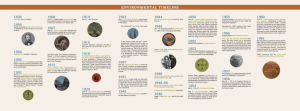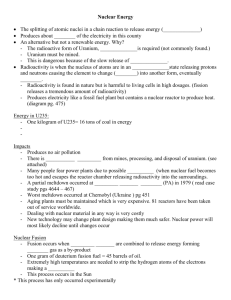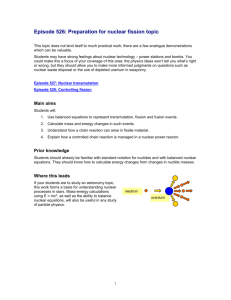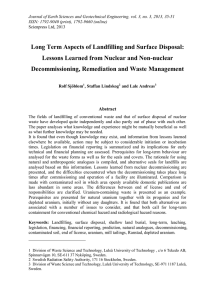Ecocide and Genocide in the American West
advertisement
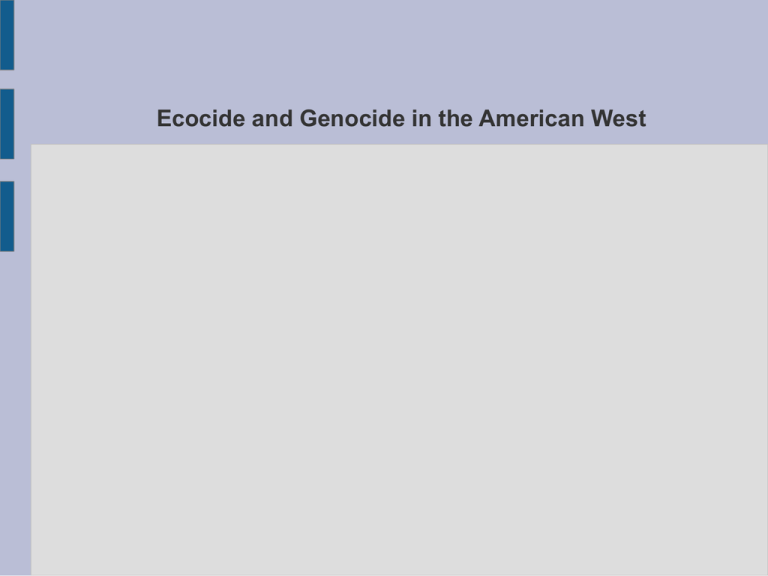
Ecocide and Genocide in the American West John Muir John Muir (1838-1914) was born in Scotland but his family emigrated to the United States in 1849 where they settled in Wisconsin. Is credited as the founder of the Sierra club, one of the largest grassroot enviromental organisations in the US. Was fundamental in the establishment of Yosemite, Sequioa and General Grant National parks. Greatest struggle was against Gifford Pinchot over Hetch Hetchy Valley and whether it should be damned or remain part of Yosemite National Park. Died of pneumonia on December 24th 1914, almost exactly a year after the Hetch Hetchy Damn was approved. John Muir Muir had an extremely spiritual view of the natural world, willing to underplay it if he thought it would put others off. Argued that deforestation would cause flooding and cause more problems than it solved. Alexander von Humboldt and George Perkins Marsh. John Muir . Once quoted as saying “if a war of the races should occur between wild beasts and Lord Man, I would be tempted to sympathise with the bears”. Environmentalism in the New Deal FDR a keen conservationist like his cousin Theodore Roosevelt. Need to create jobs as part of the New Deal combined with infrastructural issues in the National Parks lead to the creation of the Civilian Conservation Corp 1933-1942 Employed men between 18-25 to build roads and trails to and within the National Parks, amongst other things Wilderness Society 1935, Aldo Leopold, Robert Sterling Yard, Bob Marshall. Conservation vs. Preservation round 2. Ecocide in the Atomic Era Radioactive rainfall in Chicago 1955. National Committe for a Sane Nuclear Policy (SANE) 1951, Co-Chairmen: Norman Cousing of the Saturday Review, Clarence Pickett of American Friends Service Committee. Partial Nuclear Test Ban Treaty 1963, “an ecological blessing”, MIT Arms Control Specialist Bernerd T. Field. Treaty does not ban the testing of nuclear weapons underground. During the 1950s the Federal government was the sole purchaser of Uranium. Duck and Cover http://www.youtube.com/watch?v=IKqXu-5jw60 Nuclear Weapons test (3:00) http://www.youtube.com/watch?v=9nvTd5mNRz0 Implications for Native Americans Around 60% of the USA's uranium reserves are under Native land. On top of this over 90% of US Uranium mining and milling processes takes place in or directly adjacent to Native land. End of the Cold War has brought about the need to dispose of Nuclear material on a grand scale. Enviromental racism? National Sacrifice Area: Four Corners Region So called for being where Utah, Arizona, Colorado and New Mexico intersect. Home to various nations, namely the Navajo (or Diné), Southern Ute, Ute Mountain, Zani, Acoma amongst others. 1952- US Interior Department Bureau of Indian Affairs grants a contract to Kerr-McGee Corporation to mine for Uranium. Original contract did not include a “clean up clause”. 1983 study by the Enviromental Protection Agency (EPA) classified 1000 “significant” nuclear waste sites within Navajo territory. Questions Is “enviromental racism” an accurate term to describe how Native American peoples have been treated with regards to US nuclear policy?
